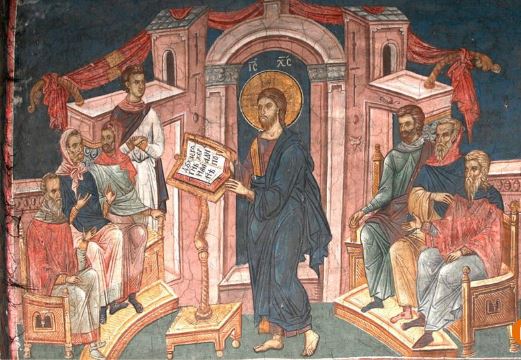Translation from the book:
Στεργίου Ν. Σάκκου, Ἑρμηνεία στό κατά Λουκᾶν Εὐαγγέλιο, τόμ. Α΄,
ἐκδ. «ΧΡΙΣΤΙΑΝΙΚΗ ΕΛΠΙΣ» ΟΡΘΟΔΟΞΗ ΑΔΕΛΦΟΤΗΤΑ, Θεσ/νίκη 2008, σσ. 183-191
(Stergios N. Sakkos [Read CV], A Commentary on the Gospel according to St. Luke, vol. A', pp. 183-191)
Jesus' visit to Nazareth is recounted in detail by the evangelist Luke, while the other evangelists mention it briefly (see Mt 13:53-58; Mk 6:1-6).
4,16. Καὶ ἦλθεν εἰς τὴν Ναζαρέτ, οὗ ἦν τεθραμμένος, καὶ εἰσῆλθε κατὰ τὸ εἰωθὸς αὐτῷ ἐν τῇ ἡμέρᾳ τῶν σαββάτων εἰς τὴν συναγωγήν, καὶ ἀνέστη ἀναγνῶναι.
4:16 And he came to Nazareth, where he had been brought up; and he went to the synagogue, as his custom was, on the sabbath day and he stood up to read.
Jesus was born in Bethlehem, but after his return from Egypt he settled and lived in Nazareth; for this reason, he was given the nickname "Nazarene" (Mt 2:23). At the beginning of his public ministry, and after having previously preached and worked miracles in the greater region of Judea and Galilee, “he came to Nazareth, where he had been brought up”. He wished to visit his countrymen, to pay tribute to the place where he had been brought up; St. Theophylact writes "that he may teach us, first to benefit and teach our familiar persons and then to pour out charity to others.".
In Nazareth he went to the synagogue, “as his custom was”, on the Sabbath day. It was Jesus’ custom, all the time he was in Nazareth, to go to the synagogue every Sabbath. This habit of his shows that it is a God-pleasing act to attend the sacred assemblies of the believers.
In the synagogue the speakers read the passage standing up, thus expressing their respect for the sacred text. Jesus, who for years had been a mere listener and learner in that place, rose as a teacher this time to read, “he stood up to read”, and then he boldly preached to his countrymen.
4,17. Καὶ ἐπεδόθη αὐτῷ βιβλίον Ἠσαΐου τοῦ προφήτου, καὶ ἀναπτύξας τὸ βιβλίον εὗρε τὸν τόπον οὗ ἦν γεγραμμένον.
4:17 And there was handed to him the book of the Prophet Isaiah and opening the book, he found the place where it was written.
The books of that time were in the form of a roll, which was kept in a scroll. The whole Old Testament was contained in twenty-two scrolls. The servant of the synagogue gave to the Lord “the book of the Prophet Isaiah”, that is, the corresponding scroll. The Lord unrolled the roll and found the scheduled passage of the day; it was the first two verses of the 61st chapter of Isaiah's prophecy.
4,18-19. Πνεῦμα Κυρίου ἐπ᾿ ἐμέ, οὗ εἵνεκεν ἔχρισέ με, εὐαγγελίσασθαι πτωχοῖς ἀπέσταλκέ με, ἰάσασθαι τοὺς συντετριμμένους τὴν καρδίαν, κηρῦξαι αἰχμαλώτοις ἄφεσιν καὶ τυφλοῖς ἀνάβλεψιν, ἀποστεῖλαι τεθραυσμένους ἐν ἀφέσει, κηρῦξαι ἐνιαυτὸν Κυρίου δεκτόν.
4:18-19 "The Spirit of the Lord is upon me, because He has anointed me. He has sent me to preach the gospel to the poor, to heal the brokenhearted, to announce release to the captives and recovery of sight to the blind, to send away free those whom tyranny has oppressed, to preach the acceptable year of the Lord”.
The passage which Jesus read in the synagogue of Nazareth concerned the person of the Messiah, the salvation and the glory which he would offer to God's people. The Messiah spoke with the mouth of the prophet Isaiah and said, "The Spirit of the Lord is upon me, because He has anointed me.” In him the Holy Spirit rests and makes him the above all and sole "Christ". His mission was summarized as follows:
a) “He has sent me to preach the gospel to the poor”; he brings a message of happiness to the poor, that is, to the humble and despised who seek God and await divine redemption.
b) “to heal the brokenhearted”; he gives healing to those who are broken-hearted, to the desperate and disappointed.
c) “to announce release to the captives”; he preaches deliverance from the yoke of the captivity of Satan and sin.
d) “recovery of sight to the blind”; he gives to the blind a light, both natural and spiritual.
e) “to send away free those whom tyranny has oppressed”; he gives forgiveness, healing and restoration to the broken and weary, to the failed people. He gives them hope and opens a way out of their deadlock.
It is noteworthy that the Lord formulates the fifth goal of his mission using a passage from an earlier chapter of Isaiah (see 58:6) and not from the specific passage (Is 61:1-2), which he used for the other goals. As the owner and possessor of the Holy Scriptures, he could, of course, use them freely. Finally, in the next sentence he summarizes all the aims of his mission.
f) “to preach the acceptable year of the Lord”; He preaches the jubilee year of God. Every fifty years the Jews proclaimed with trumpets and drums the beginning of the jubilee year, during which debts were cancelled, slaves were freed, and fields were left uncultivated (see Lev 25:8-13). The purpose of this feast was to maintain equality among the Israelites and to keep the land fallow. It was a foretaste of the Messianic era, when the faithful would enjoy fatherly goodness, which forgive sins, free them from their passions, give them light and spiritual restoration, true rest and peace.
4,20. Καὶ πτύξας τὸ βιβλίον ἀποδοὺς τῷ ὑπηρέτῃ ἐκάθισε· καὶ πάντων ἐν τῇ συναγωγῇ οἱ ὀφθαλμοὶ ἦσαν ἀτενίζοντες αὐτῷ.
4:20 And rolling up the book, he returned it to the attendant, and sat down; and the eyes of all in the synagogue were fixed on him.
After the reading of the passage, the Lord “rolling up the book”, rolled up the roll-book, and “he returned it to the attendant” after returning it to put it back to its place (see comments on 4:15), “sat down”; only during the reading was the reader to remain upright. Jesus' stature, the way in which he read the passage - his fame had already preceded him - attracted the attention of all. Thus “the eyes of all in the synagogue were fixed on him”, all fixed their gaze on him.
4,21. ῎Ηρξατο δὲ λέγειν πρὸς αὐτοὺς ὅτι σήμερον πεπλήρωται ἡ γραφὴ αὕτη ἐν τοῖς ὠσὶν ὑμῶν.
4:21 And he began to say to them, “Today this scripture has been fulfilled in your ears.”
With clarity and simplicity, the Lord interpreted the prophecy he read, assuring that it is fulfilled “today” in his person. He is not merely "the Lord's anointed" but "Christ the Lord" (see Lk 2:11); he does not need to be anointed, because - already from the hour of his incarnation - he has all the Holy Spirit as a God-man, equal and of the same substance to the Father and the Paracletus (see comments on 4:1). Isaiah's prophecy is the Messiah’s proclamation. As Jesus applies it to himself, he reveals that he is:
a) the teacher who by his wisdom will teach the truth and deliver men from ignorance, fallacy and pain;
b) the high priest who by his sacrifice will redeem the world from sin, decay and death;
c) the king who by his power will create an eternal kingdom, in which the faithful will enjoy the happiness of the Messianic age.
4,22. Καὶ πάντες ἐμαρτύρουν αὐτῷ καὶ ἐθαύμαζον ἐπὶ τοῖς λόγοις τῆς χάριτος τοῖς ἐκπορευομένοις ἐκ τοῦ στόματος αὐτοῦ καὶ ἔλεγον· οὐχ οὗτός ἐστιν ὁ υἱὸς Ἰωσήφ;
4:22 And all were attesting about him, and wondered at the gracious words which proceeded out of his mouth; and they said, “Is not this Joseph’s son?”

4,23. Καὶ εἶπε πρὸς αὐτούς· πάντως ἐρεῖτέ μοι τὴν παραβολὴν ταύτην· ἰατρέ, θεράπευσον σεαυτόν· ὅσα ἠκούσαμεν γενόμενα ἐν τῇ Καπερναούμ, ποίησον καὶ ὧδε ἐν τῇ πατρίδι σου.
4:23 And he said to them, “Doubtless you will quote to me this proverb, ‘Physician, heal yourself; what we have heard you did at Capernaum, do here also in your own country.’”
The Lord who sees in the hearts knows the meditations of his countrymen. They were ready to tell him the parable, “the proverb” which was common among the Jews, but also among the Romans and the Greeks: “Physician, heal yourself”. If you cannot perform also in Nazareth some of the signs you did in Capernaum, so that you may help yourself and free yourself from the contempt of your countrymen, how do you claim that you will heal others by applying to yourself "heal the brokenhearted"?
The Lord, however, performed signs only for the believers, who could reap some benefit from them. He refused to make a sign in his village because he discerned the unbelief of the Nazarenes; he did not want to win their faith in a dynamic and impressive way. He confined himself to reminding them of the prophecy, so that by combining it with what they knew of his person, they might understand who he really was. On the other hand, while they had all the evidence that should lead them to sincere admiration, they expressed contempt for him. Thus, the wickedness of the inhabitants of Nazareth was revealed (cf. Jn 1:47).
4,24. Εἶπε δέ· ἀμὴν λέγω ὑμῖν ὅτι οὐδεὶς προφήτης δεκτός ἐστιν ἐν τῇ πατρίδι αὐτοῦ.
4:24 And He said, “Truly, I say to you, no prophet is acceptable in his own country”.
Beginning with “Truly” Jesus gives solemnity to his word. The proverb he mentioned, "no prophet is acceptable in his own country," was also applicable to the prophets of the Old Testament (see Jer 11:21). In a small society it is easier for the personality of a stranger to stand out. A well-known and familiar person is usually deprived of the honour due to him, because his superiority is not recognised, but on the contrary he provokes envy.
4,25-27. Ἐπ᾿ ἀληθείας δὲ λέγω ὑμῖν, πολλαὶ χῆραι ἦσαν ἐν ταῖς ἡμέραις Ἠλιοὺ ἐν τῷ Ἰσραήλ, ὅτε ἐκλείσθη ὁ οὐρανὸς ἐπὶ ἔτη τρία καὶ μῆνας ἕξ, ὡς ἐγένετο λιμὸς μέγας ἐπὶ πᾶσαν τὴν γῆν, καὶ πρὸς οὐδεμίαν αὐτῶν ἐπέμφθη Ἠλίας εἰ μὴ εἰς Σάρεπτα τῆς Σιδωνίας πρὸς γυναῖκα χήραν. Καὶ πολλοὶ λεπροὶ ἦσαν ἐπὶ Ἐλισαίου τοῦ προφήτου ἐν τῷ Ἰσραήλ, καὶ οὐδεὶς αὐτῶν ἐκαθαρίσθη εἰ μὴ Νεεμὰν ὁ Σύρος.
4:25-27 But in truth, I tell you, there were many widows in Israel in the days of Elijah, when the heaven was shut up three years and six months, when there came a great famine over all the land; and Elijah was sent to none of them but only to Sarepta, in the land of Sidon, to a woman who was a widow. And there were many lepers in Israel in the time of the prophet Eliseus; and none of them was cleansed, but only Naaman the Syrian.”
Jesus wanted to bring his countrymen to consciousness and repentance. That is why he talked to them severely, using two examples from the Old Testament, which interpreted his attitude towards them.
The first incident refers to the prophet Elijah (see 1 Kings 17:1-16; cf. Jas 5:17-18). In his days the sky closed and it did not rain for three years and six months. The drought affected the crops and there was a famine throughout the land. So then, while the foreign queen Jezebel was trying to mislead the Israelite people into idolatry, God sent the prophet Elijah “to Sarepta, in the land of Sidon”; he stayed in the house of a foreign widow and by a miracle he made the family's flour and oil not to run out. That was a turn towards the nations at the time of the strict nationalistic mindset of the Old Testament.
The second example concerns the prophet Elisha (see 2 Kings ch. 5). In his time there were many lepers (see 2 Kings 7:3), but of all of them only Naaman the Syrian, an idolater, was healed. God is just and is not influenced by persons. He makes miracles to those who show faith in his power, even if they are Gentiles. Jesus also met Gentiles with great faith. He admired and rewarded them (see Mt 8:10-15:28).
The two examples from the O.T. point out that;
a) The inhabitants of Nazareth were unworthy to see miracles, because of their stubborn disbelief.
b) The preaching of the gospel would embrace the Gentiles, not to be corrupted by them, but in order to convert them into believers, to Christianize them. This is the message which the evangelist Luke conveys with particular emotion and perseverance.
c) After his resurrection the Lord will leave not only his countrymen but also all Israelites and will turn to the Gentiles. The same is the meaning of "the sign of the prophet Jonas" (Mt 12:39-40; Lk 11:29-30), with which the Lord later threatened the hard-hearted scribes and Pharisees, who demanded a sign from him. This proclamation not only frightened but also angered the Jews, because they considered themselves to be the only and exclusive recipients of God's blessings.
4,28. Καὶ ἐπλήσθησαν πάντες θυμοῦ ἐν τῇ συναγωγῇ ἀκούοντες ταῦτα.
4:28 When they heard this, all in the synagogue were filled with anger.
Hearing Jesus’ last words, the Nazarenes were very angry. They could not bear his scrutiny. They demanded an exceptional favour from their countryman. Their behaviour proved that the Lord had dealt with them in a very right and just way. Zigavinos comments "From what they tried to do they showed themselves not to be worthy of signs and confirmed the Savior’s word".
4,29-30. καὶ ἀναστάντες ἐξέβαλον αὐτὸν ἔξω τῆς πόλεως καὶ ἤγαγον αὐτὸν ἕως ὀφρύος τοῦ ὄρους, ἐφ᾿ οὗ ἡ πόλις αὐτῶν ᾠκοδόμητο, εἰς τὸ κατακρημνίσαι αὐτόν· αὐτὸς δὲ διελθὼν διὰ μέσου αὐτῶν ἐπορεύετο.
4:29-30 And they rose up and led him out of the city, and led him to the brow of the hill on which their city was built, that they might throw him down the cliff. 30 But passing through the midst of them he went his way.
The anger of the Nazarenes was so intense that, although they were impressed by Jesus' teaching (see v. 22), they decided to avenge him immediately for the insult he gave them. So, they took him out of the city and led him “to the brow of the hill’, to the top of the mountain on which Nazareth was built, so that they could throw him down from there.
How the Lord escaped from certain death is not mentioned. Most likely, when they carried him to the edge of the cliff, their hands were paralyzed. Then Jesus passed “through the midst of them” and went away, like a king among the guards who made way for him, or like a victor among his defeated opponents.
Jesus was "guarded by the divinity united with him". He had the power to "lay down" his life or to "take it" when he himself wished (see Jn 10:18). He was, moreover, in the beginning of his preaching. He had not preached the word of truth yet, so it was not time to be led to death. Later on, there were some other attempts by his enemies to arrest him, but they failed, “because his hour was not yet come” (see Jn 7:30). Jesus marched towards his voluntary passion keeping a predetermined plan. He delivered himself into the hands of his enemies, when he felt it was the right time and finally, he gave up his spirit on the cross, saying, "It is finished" (Jn 19:30).
Copyright © 2021 by Orthodox Christian Association «ΧΡΙΣΤΙΑΝΙΚΗ ΕΛΠΙΣ» ΟΡΘΟΔΟΞΗ ΑΔΕΛΦΟΤΗΤΑ. Used by permission. All rights reserved.









